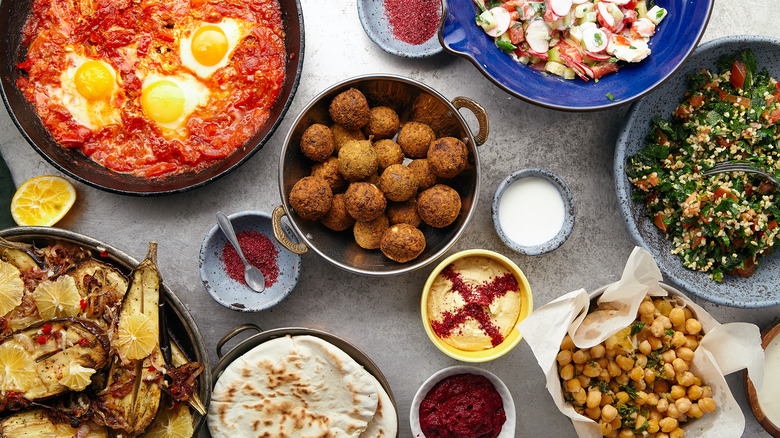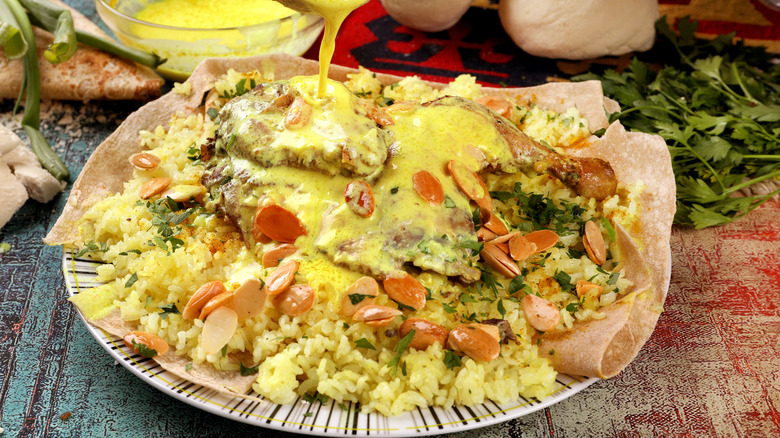Why Israel Is A Great Culinary Destination, According To Erez Komarovsky - Exclusive
Many people think of Israel as a place to travel to for spiritual reasons — after all, this is a destination that's a sacred land to Jews, Christians, and Muslims (per TripSavvy). Even if you have no plans to visit the Western Wall, or have no interest in dipping your toes in the Sea of Galilee, you might still want to book yourself a ticket to Tel Aviv. Because according to chef Erez Komarovsky (nickname: "The godfather of Israeli cuisine," per Urban Daddy), Israel is also an excellent place to nosh.
In an exclusive interview with Mashed, Komarovsky, who is the founder of Israeli bakery chain Lehem Erez, explained that contrary to popular opinion, food in Israel is not strictly "Jewish food," but a culmination of a variety of religions, cultures, and customs. "Israeli cuisine is ... also from dishes that my grandmother brought with her from Poland. It consists also from someone's, say, Persian grandmother's recipes," he explained. "Because we don't have one heritage. We don't have one tradition. Israeli cuisine is [completely] idiosyncratic ... a mix of so many different culinary cultures that can happen only when they live together."
Case in point: Iraqi kubbeh and Turkish fish. "In Iraq, kubbeh is cooked the way kubbeh is cooked for centuries," Komarovsky said, referring to this popular Jewish beet soup. "In Turkey, fish is cooked the way it is cooked for centuries. In Israel, where an Iraqi housewife or chef meets a Turkish neighbor, and they start giving one another to taste — then suddenly, the Iraqi chef is influenced by a small technique or a small flavor, or introduces a different spice that his mother has used, and he is allowed to do it because all of us are doing it. All of us are doing it!"
These are the best Israeli foods to try, according to Erez Komarovsky
So once you arrive in Israel, what kind of grub should you grab from the get-go? Komarovsky suggested making a bee-line for meat that's been slow-cooked. "I think a large part of Israeli cuisine is cooked slow," he explained, "both in the North African cuisines and in Turkish-originated cuisine, large Syrian cuisine, the Shami cuisine, and from all over, actually, Iraqi and stuff." Two of his top picks are mansaf and maqluba, which are rice-and-meat recipes that have Jordanian roots (per The Culture Trip).
Got your fill of meat? Nibble on a warm, freshly baked slice of challah while wandering by the Dead Sea. Enjoying traditional Jewish baked goods in Israel can be a transformative experience for anyone who enjoys sinking their teeth into really good dough. "I think challah bread is having a renaissance. I think babka is having a renaissance," Komarovsky pointed out. Other traditional Jewish foods are also popular in Israel, he added, like chicken soup. "We have herring sandwich, [which] is something that is very, very Israeli. It became very Israeli. It almost died because there was a time where Ashkenazi cuisine was considered to be a dinosaur and was looked upon as a 'gray food' with no flavor. Now, we are starting to use our heritage also and introducing it into what you call, 'Mediterranean,'" he explained.
If you're interested in learning Israeli cooking, you'll definitely want to check out Chef Erez Komarovsky's class on the roots of Middle Eastern cuisine over at YesChef.

